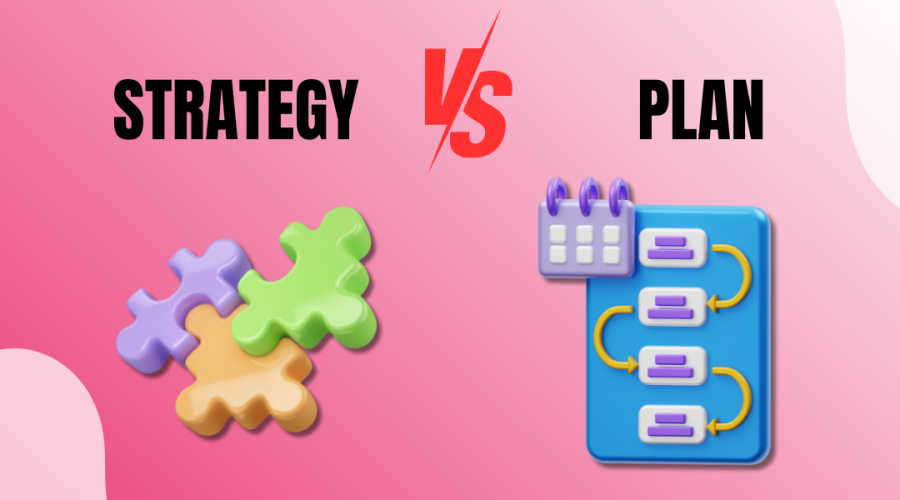IS THERE A DIFFERENCE BETWEEN HAVING A PLAN AND A STRATEGY?
Plans and strategies are in place to achieve every business goal, from recruitment to increasing customer numbers and bottom line. People often use the terms to refer to the same methods, but they mean different things. Here’s what distinguishes a plan from a strategy and when you can use it.
Plan vs. Strategy Defined
You create a plan when you set a long-term goal and develop a roadmap to achieve it. When you strategize, you brainstorm the best course of action to reach that target.
For example, if the goal is to penetrate a national market, your plan can look like a universal marketing improvement. Your strategy can be implementing price adjustments to acquire new customers or add more product features.
Both business actions are complementary and will help you advance your organization if leveraged well. In many cases, companies apply both.
Long-Term vs. Short-Term Goals
An evident difference between a plan and a strategy is the timeline. Plans center on company goals attainable in the long term, at least 12 months or more into the future. A good example is taking your business globally.
On the contrary, a strategy covers short-term goals spanning months or less than a year. It includes key business objectives, project initiatives and financial management. It’s typical for organizations to have both short- and long-term goals, achievable with strategic planning.
Flexible vs. Permanent
A plan and a strategy are opposite sides of a coin. The former is static, while the latter is dynamic. Planning sets a roadmap and shifts your focus, effort, time, and resources to meet the goal. It dictates you follow the suggested steps in the draft. Otherwise, you’ll have to start from scratch with plan B.
Strategy is the reverse, as it’s adjustable on the fly. Only 10% of businesses actually complete all or even almost all of their initial strategy objectives. Fortunately, you can and should launch a new strategy if the first doesn’t provide a satisfying outcome. If your ad campaigns don’t meet your revenue target, changing to email marketing and using personalization tactics may work.
It’s easier to change one strategy to another because of their versatile nature. Unlike a long-term plan, if one part doesn’t work out as expected, you can pivot with fresh ideas.
Predictable vs. Unforeseeable
Another differentiation between the two is how they’re implemented within the organization. A plan is something you expect to occur in the future, such as to increase your sales or hire more workers by the end of the year. There’s a limit to the moving pieces you can control, making it hard to anticipate the outcome. For example, the government could enact legislative changes or release regulations regarding the use of your product or service, which can negatively impact your business. As a consequence, your plan may fail.
Conversely, a strategy is predictable as it’s based on your organization’s history, particularly on what tactics have worked previously. It allows you to foresee the outcome at some level. If data shows your business performs well during holidays, you can start early and double your efforts for seasonal marketing campaigns to meet your goals.
Level of Reporting and Monitoring
A plan is a foundation for your business’s future, so you need to track, measure, and monitor the progress of your actions. The quantifiable data will help you analyze whether you’re heading in the right direction or are on schedule with projects and deliverables.As a strategy is flexible and changes continuously, it can be challenging to put specific numbers to it. Hence, it doesn’t demand a high level of monitoring or reporting. As long as everything is executed adequately, you’ll soon find success.
Leverage Plan and Strategy Appropriately
Think of your plan as the backbone of your organization and the strategy as the muscles webbed on it to support your movement. Business owners must work collaboratively to run their companies. This combination will allow you to zero in or out on every aspect of your company, see potential loopholes and find solutions for them.
In conclusion, at Haystayk, we understand the intricate nuances between having a plan and a strategy. More than just listing businesses, we offer a holistic approach to supporting service SMEs. Our aim is to empower you with the knowledge, insights, and tools necessary to navigate the complexities of marketing and promoting yourselves in today’s dynamic landscape. With Haystayk by your side, you can confidently chart a course towards success.

